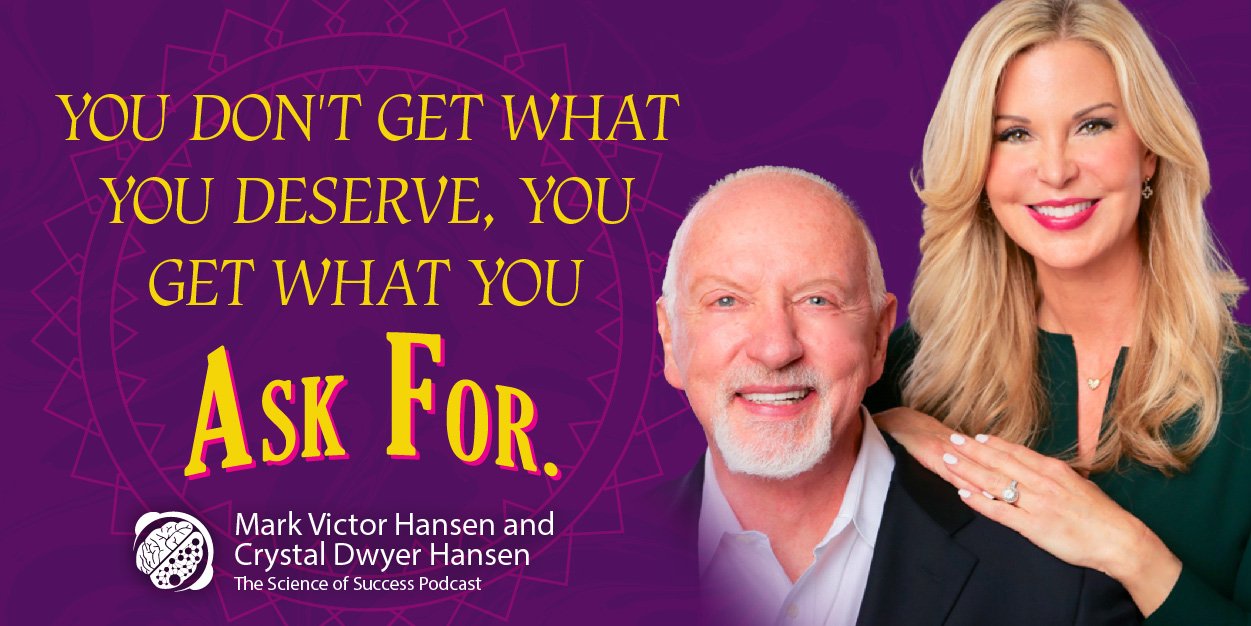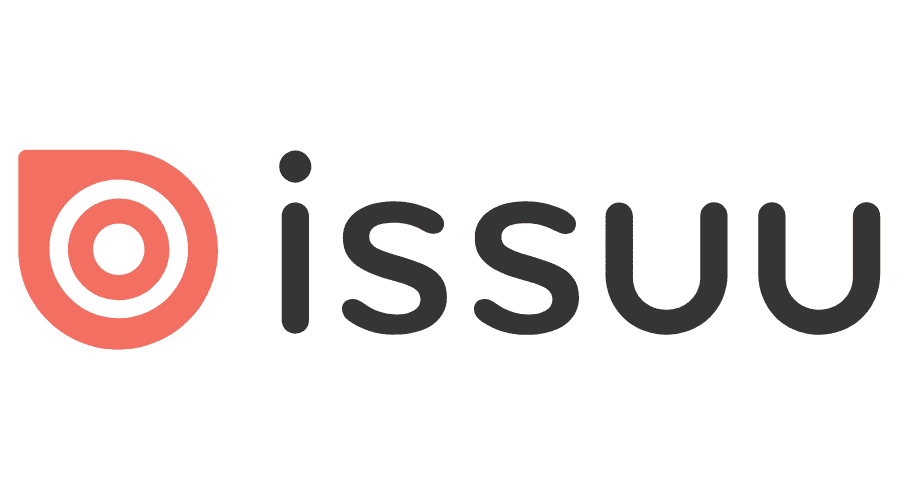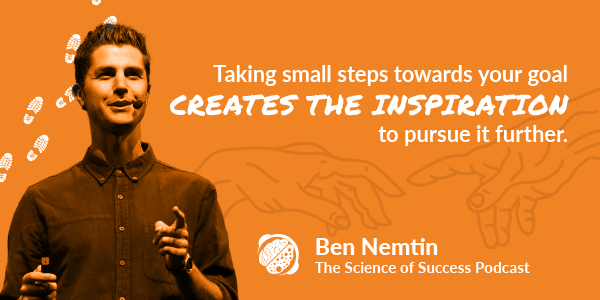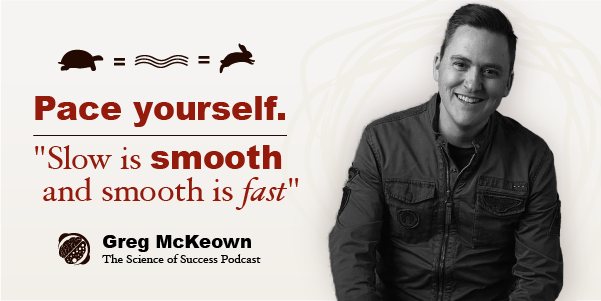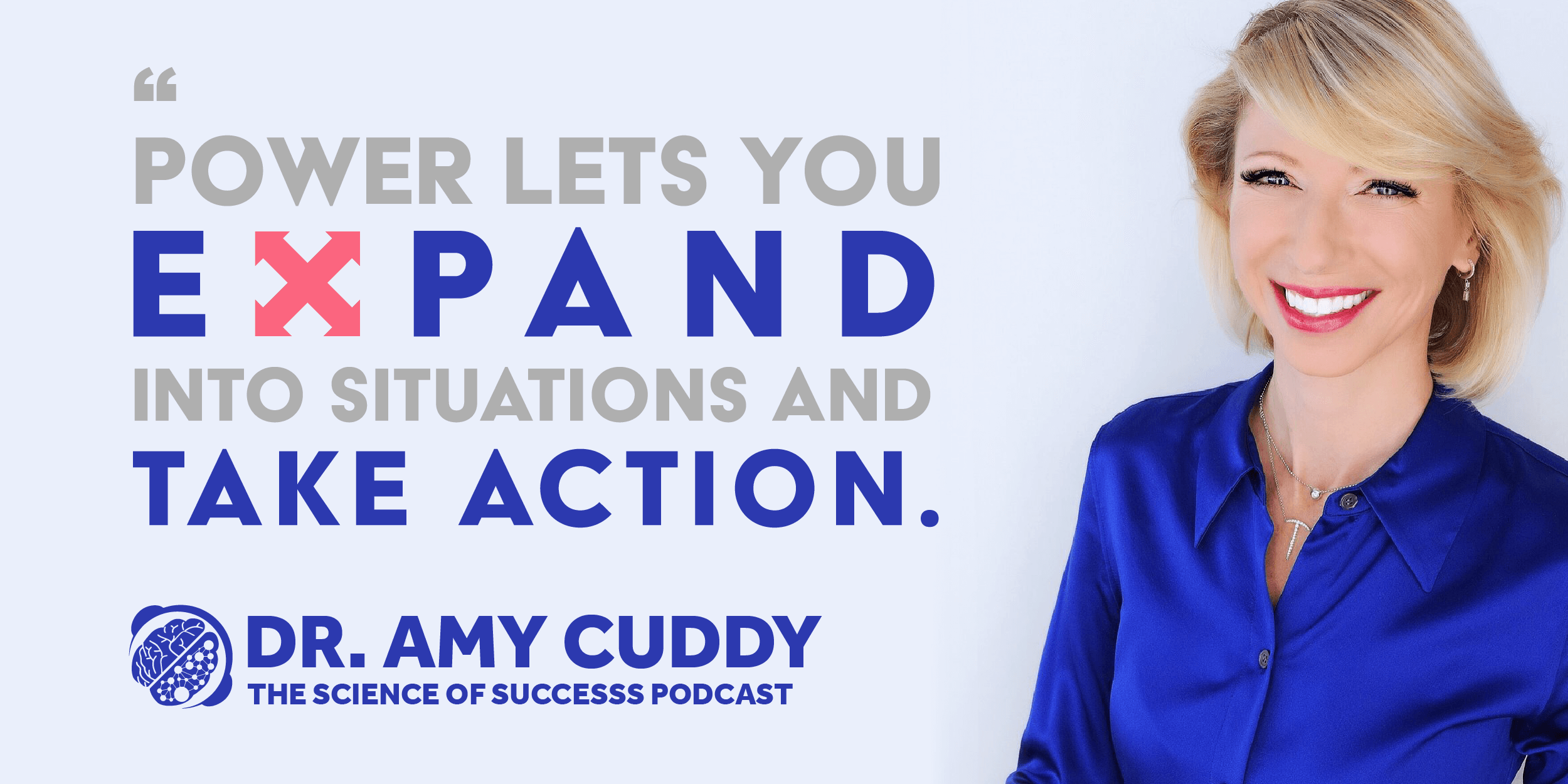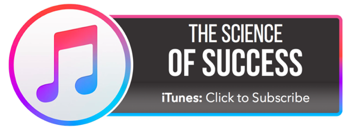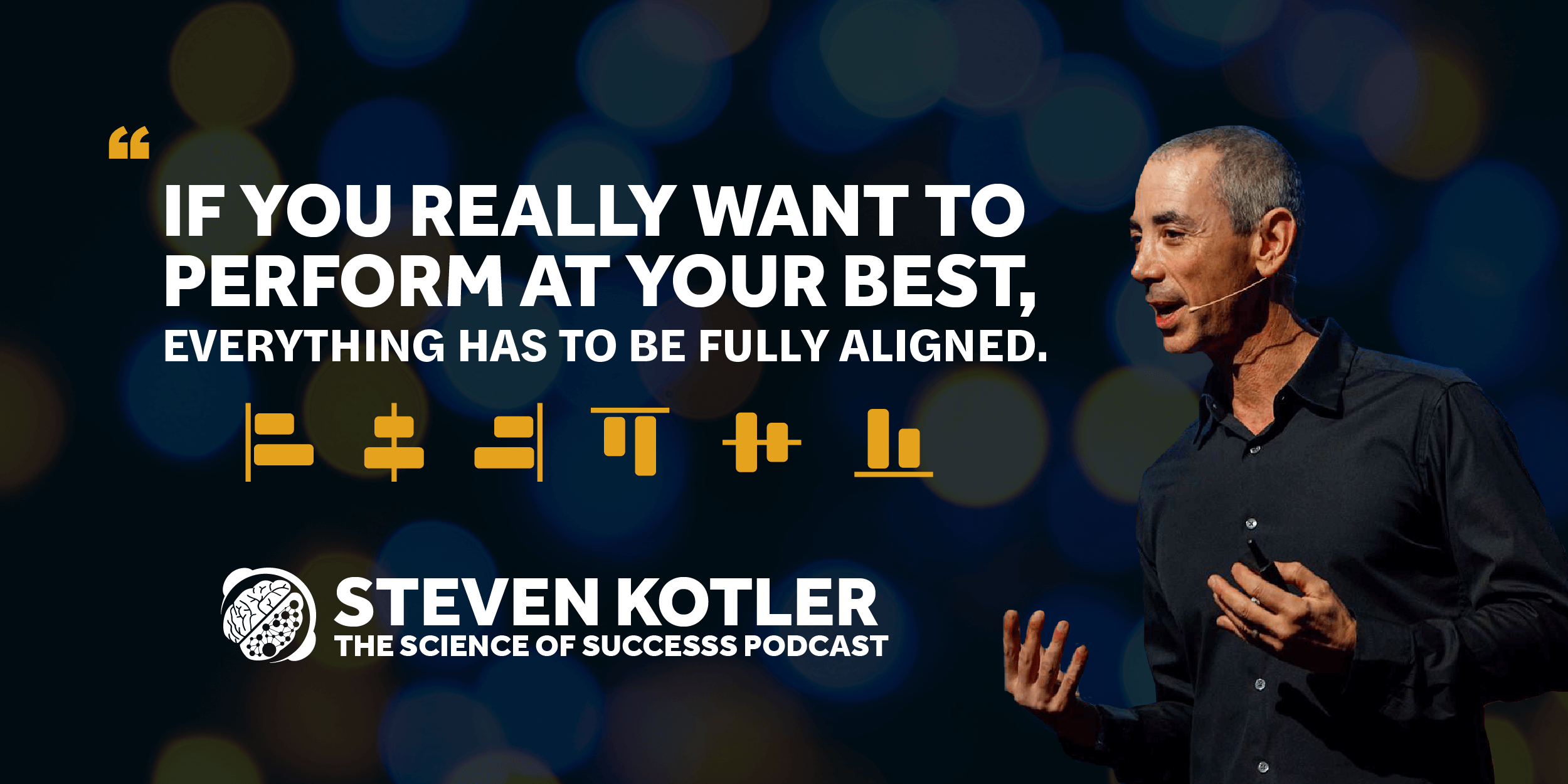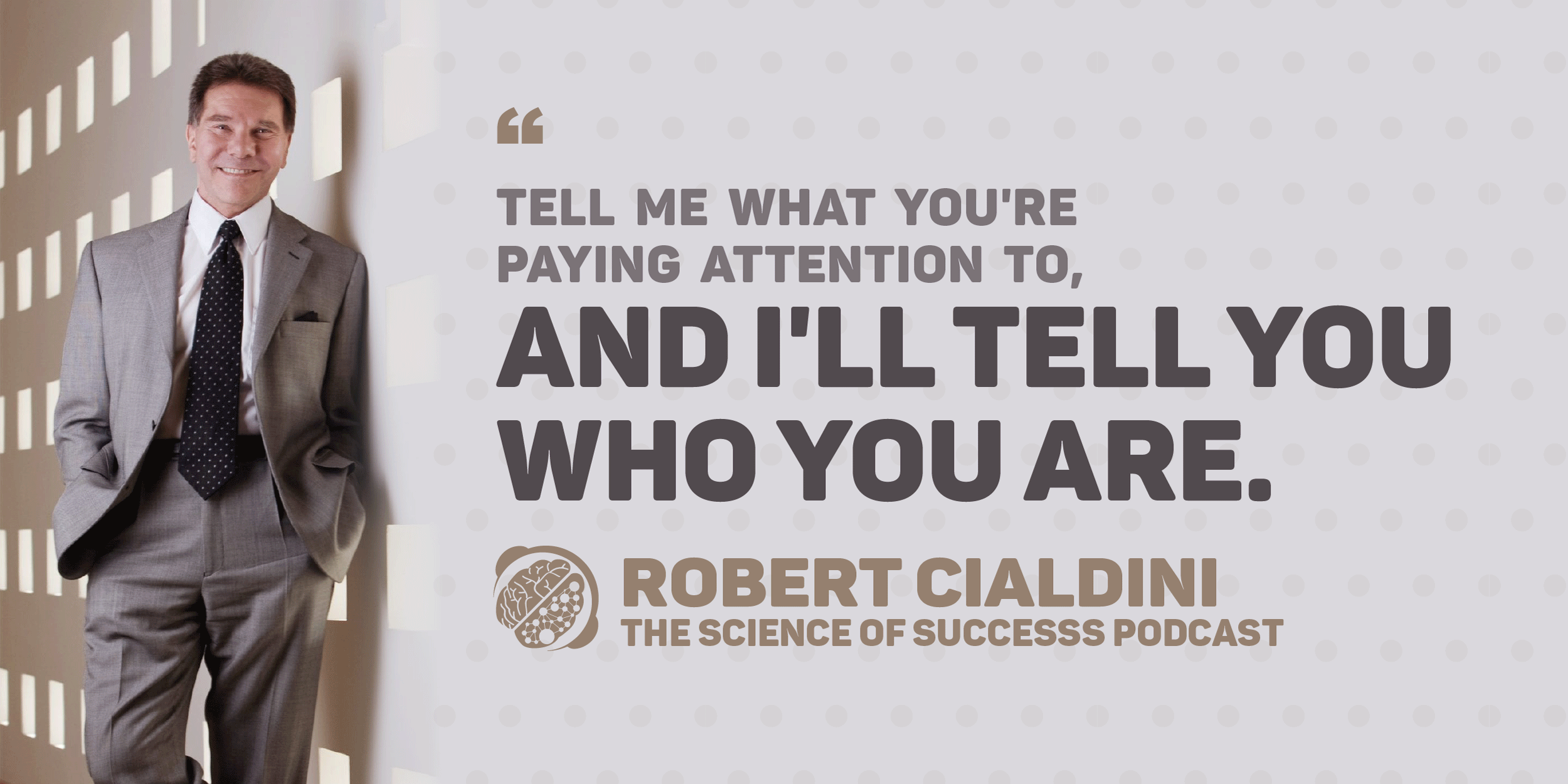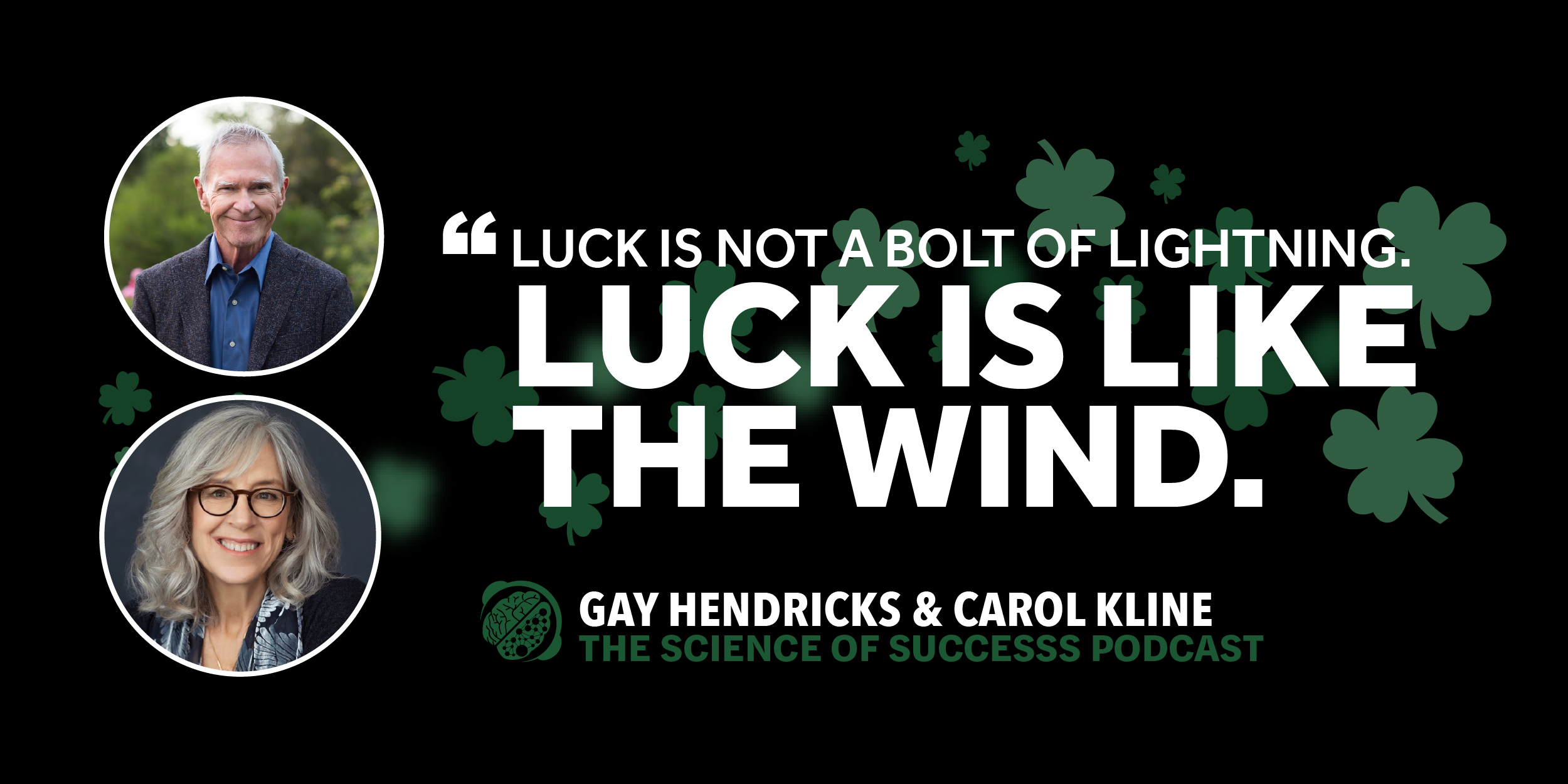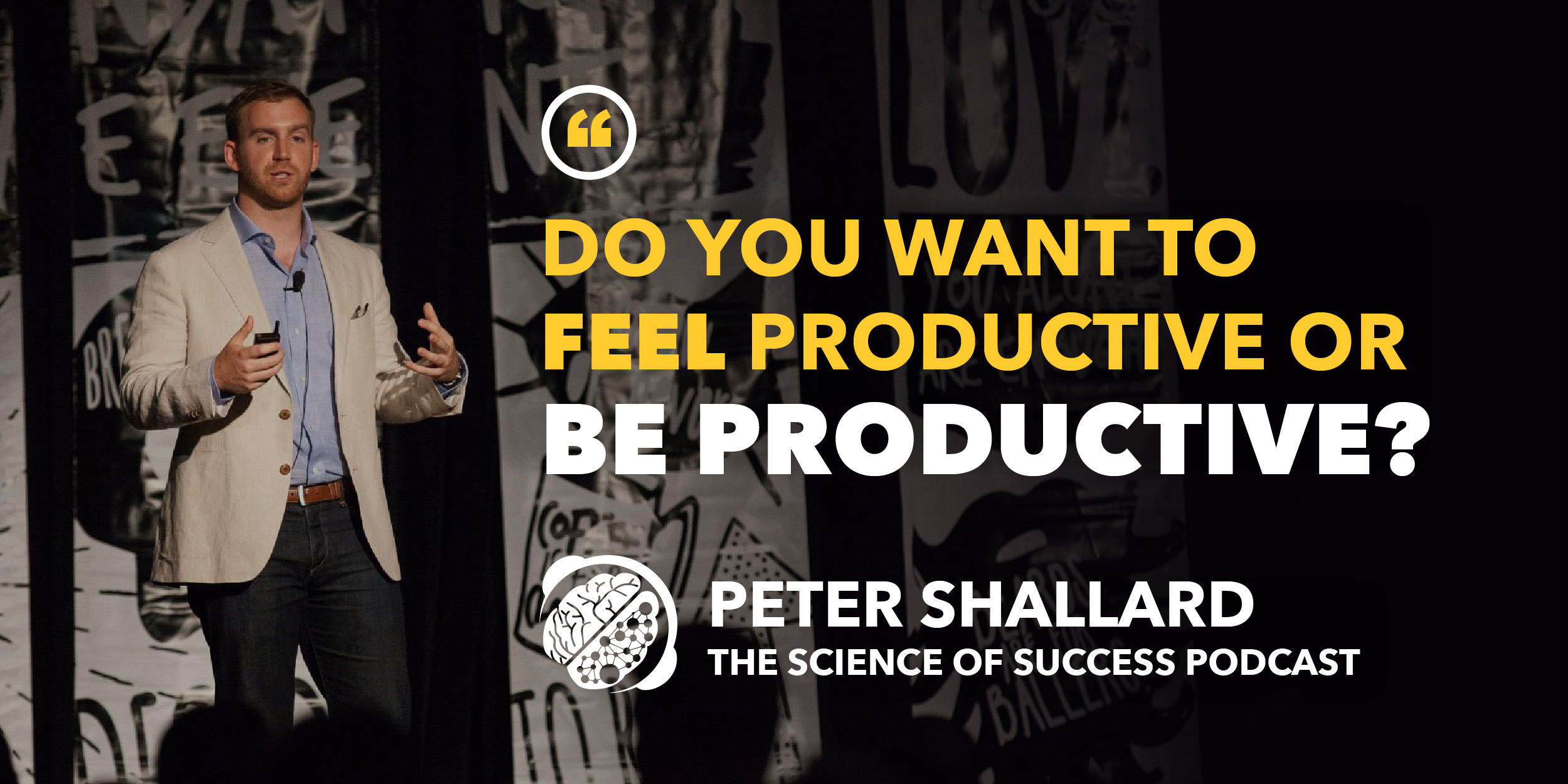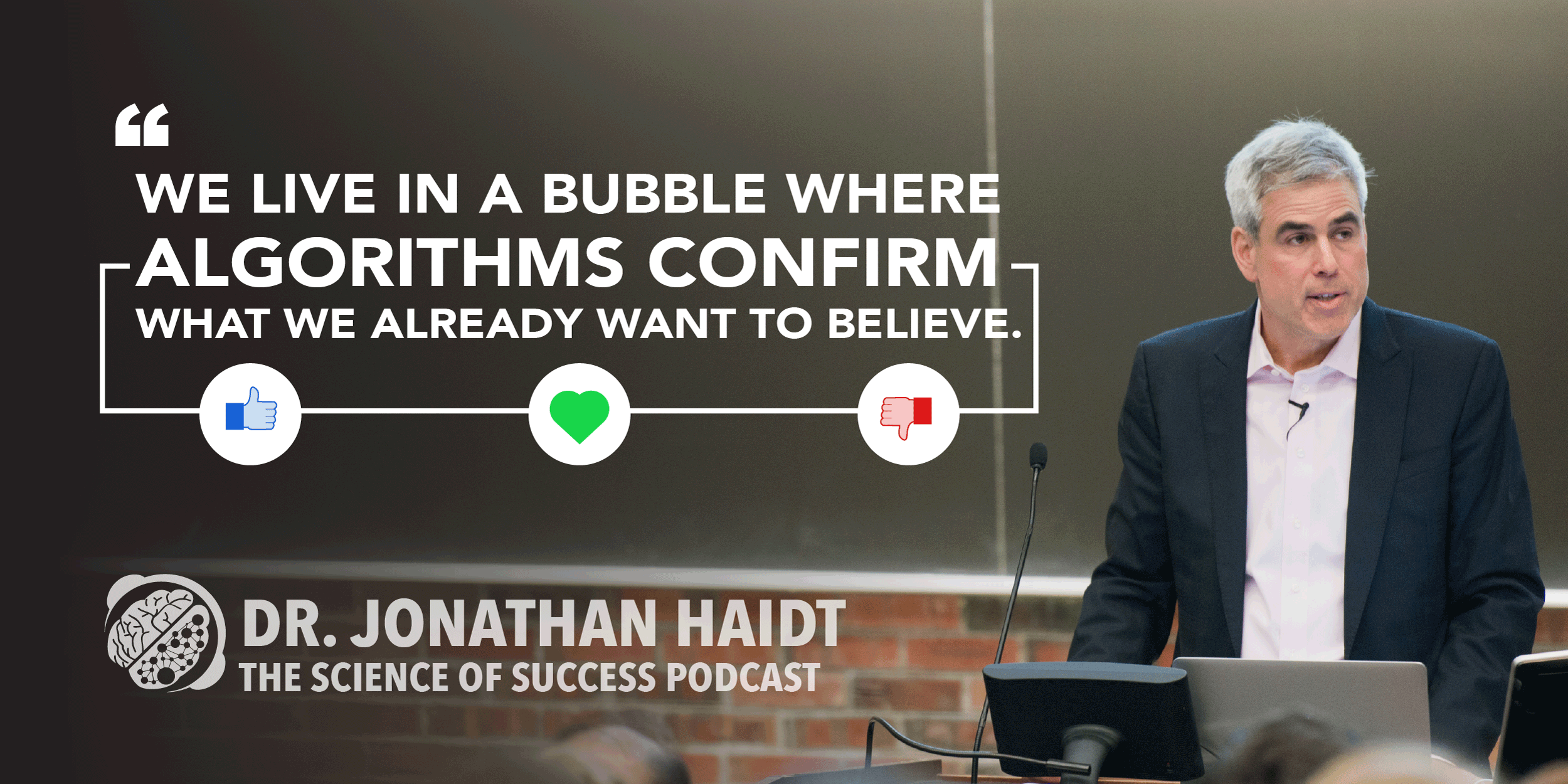How Asking Can Transform Your life with Mark Victor Hansen and Crystal Dwyer Hansen
Mark Victor Hansen is an American inspirational and motivational speaker, trainer and author. He is best known as the founder and co-creator of the Chicken Soup for the Soul book series. Mark has spoken to over 6,000 audiences world-wide and continues to receive high accolades from his audiences as one of the most dynamic and compelling speakers and leaders of our time.
Crystal Dwyer Hansen is an international speaker, researcher, corporate consultant, author, and entrepreneur. Her expertise is in the field of human potential. Crystal’s research in the fields of neuroscience, epigenetics, and quantum physics provides the scientific knowledge she uses to help people use their minds proactively and evolve their consciousness to move themselves out of misery and into a fulfilled and happy life. Mark and Crystal co-wrote their newest work, called ASK! The Bridge from Your Dreams to Your Destiny.
You don't get what you deserve, you get what you ask for.
When we're young we asked for everything we wanted.
We are all born with the natural ability to ask, and life crushes it out of us.
Bridging your dreams to your destiny
What does the science say about WHY we don't ask?
If you're wiling to put yourself out there and ask for what you want, people will HELP YOU because people LIKE To help other people.
We are not natural askers, it needs to be TAUGHT and RE-LEARNED
Asking creates greater bonds of trust and builds relationships more effectively
Seven Road Blocks to Asking
What happens when we're too proud to ask for help?
We don't ask when we feel unworthy.
You put these roadblocks in your place.
How do you handle a NO when you ask for something?
A no is not always about you, in fact its usually not about you.
There are THREE CHANNELS WITH WHICH TO ASK
ASK YOURSELF
ASK OTHERS
ASK GOD
How do you handle "NO" and bounce back when you're asking?
Building the life of your dream really starts with ASKING YOURSELF
You have to take a "reflective journey" to figure out where you are, what you want, where you want to go, and how to get there.
The three critical phases of ASKING YOURSELF
(1) Where am I now?
What's working in my life?
What's not working?
What am I enjoying
(2) Where do I want to be?
Creative
Imaginative
Design your dream life
Appreciate the power and beauty of your imagination
(3) What Specific Action Steps do I need to Take To Get there?
You must take action to get there.
Once you start asking the question you will think of things and people who can help you. You must pursue them.
Your imagination creates your reality and your materialization.
Ask yourself: what is your destiny?
How do you ASK more? How do you become a person who ASKS?
Your life experience is created from the INSIDE OUT. You create what you get in life.
75% of the thoughts we think every day are negative.
Get a journal and start tracking your asking journey.
How do you prepare yourself to become a good asker?
You need to BELIEVE that you deserve the answers.
The question is the answer. ASK.
Homework: Get a buddy to join you on your asking journey.
Thank you so much for listening!
Please SUBSCRIBE and LEAVE US A REVIEW on iTunes! (Click here for instructions on how to do that).
What interferes with your happiness?
I know better than most that your thoughts and feelings aren't always true and can hold you bak from achieving your goals.
That's why I'm excited to share with you our sponsor, BetterHelp. BetterHelp is offering 10% your first month when you go to www.betterhelp.com/sos and sign up.
BetterHelp isn't self-help, it's professional counseling. You'll get timeline and thoughtful responses from counselors and can schedule weekly video or phone sessions. All without ever having to enter a waiting room.
BetterHelp can provide you with professional counselors who are specialized in depression, anxiety, stress, relationships, grief, and much more.
Try them today and get 10% off your first month by going to www.betterhelp.com/sos!
With the stresses of this last year it’s more important than ever to practice living healthier and happier lives.
Our thoughts can be confusing enough, meditation doesn't have to be.
Headspace is your convenient dose of mediation, mindfulness, and sleep exercises to relieve stress and anxiety and help you get a good night's sleep, all in one app - making it easy to catch your breath and make time for your mental health.
And it’s one of the most science-backed meditation apps in the world proving meditation works. A study proves in just 2 weeks Headspace can reduce your stress by 14%.
Lately, I’ve been struggling with stress, calming my anxiety and falling asleep…
But, I’ve recently found Headspace and am excited to learn to meditate. So let's give it a try…
[Guided Meditation - EVE - MINI BREATHE]
That was great, wasn’t it?
Find some Headspace at Headspace.com/SUCCESS and get one month FREE of their entire meditation library.
This is the best Headspace offer available so go to Headspace.com/SUCCESS today.
flowkey was founded in Berlin by three friends, who shared the same goal: to make learning music
easy and fun. Together with a talented team, we launched flowkey in 2015. Our platform quickly
became one of the most successful music education apps, with more than 5 million registered users
and counting.
The app listens to your playing and gives you real-time feedback. Interactive features
help you learn piano at your own pace.
flowkey lets you learn piano at your own pace. The app listens to the notes you play and
checks that you’re playing correctly.
You’ll find stunning song arrangements for players of all skill levels, making it easier to learn
your favorite songs, even if you’re a beginner.
You can also take step-by-step courses to learn the basics, read sheet music, play chords,
and much more.
Try the app for 7 days free and save 20% on your first year of flowkey Premium with the link.
Go to flowkey.com/THESCIENCEOFSUCCESS to receive 7 days of flowkey Premium
for free and 20% off the first year of an annual subscription. That’s flowkey.com/THESCIENCEOFSUCCESS to receive 7 days of flowkey Premium for free and 20% off
the first year of an annual subscription.
Whether you work for yourself or you’re part of a team it’s time to get creative. Make
your online presence and your business stand out from the rest, with Issuu.
Issuu is the all-in-one platform to create and distribute beautiful digital content, from
marketing materials to magazines, to catalogs and portfolios, and more.
There’s no need for endless scrolling through PDFs. Issuu features your creative in an
easy-to-view way on every device.
Make it once and distribute it everywhere, without reformatting. Your content is already
optimized for engagement and ready to share.
Issuu also works seamlessly with tools you already use, like Canva, Dropbox, and
InDesign.
Issuu helps creators, marketers, designers, and really anyone who wants to make
content that stands out.
And you can start using Issuu for FREE. They also offer premium features that give a
more customized experience.
Get started with Issuu today for FREE or if you sign up for a premium account you will
get 50% off when you go to ISSUU dot com slash podcast and use promo code
SCIENCE.
That’s ISSUU.com/podcast and use promo code SCIENCE at checkout for
your FREE account or 50% off your premium account.
Want To Dig In More?! - Here’s The Show Notes, Links, & Research
General
Media
Mark’s article directory - Success Magazine
[Video/Text] Elizabeth Bachman Blog - “The Power Of The Ask With Mark Victor Hansen And Crystal Dwyer Hansen” by Elizabeth Bachman
[Podcast] Learning from Leaders - Why Asking Is The Key To Success With Mark Victor Hansen And Crystal Dwyer Hansen
[Podcast] Kingdom Driven Entrepreneur - KDE Podcast 293: The Power of Asking (Conversation with Mark Victor Hansen and Crystal Dwyer Hansen)
[Podcast] Superhuman Academy - MARK VICTOR HANSEN ON WRITING, ENTREPRENEURSHIP, AND THE POWER OF QUESTIONS
[Podcast] Welcome to Humanity - 017 — TURNING ADVERSITY INTO OPPORTUNITY WITH MARK VICTOR HANSEN
[Podcast] Leveraging Thought Leadership | Mark Victor Hansen | 271
Videos
Richard Greninger - Mark Victor Hansen Inspires You To Think Big!
Christopher Decker - Discover Your Destiny Through Asking with Mark Victor Hansen and Crystal Dwyer Hansen
Inspire Nation - How to Ask the Universe! Mark Victor Hansen (Chicken Soup for the Soul) and Crystal Dwyer Hansen
The Best Law of Attraction Video Ever! Mark Victor Hansen | Bob Proctor | Napoleon Hill | Neville
We Close Notes - Your Dreams Are Just an Ask Away with Mark Victor Hansen and Crystal Dwyer Hansen
Alain Wolf - The Achieved - Mark Victor Hansen & Crystal Dwyer Hansen - How To Discover Your Destiny (FULL INTERVIEW)
David Laroche World - How to become the person you most want to be by achieving your goals ? - Mark Victor Hansen
Books
Mark’s Amazon Author Page
Crystal’s Amazon Author Page
Ask!: The Bridge from Your Dreams to Your Destiny by Mark Victor Hansen , Crystal Dwyer Hansen
Episode Transcript
[00:00:04] ANNOUNCER: Welcome to The Science of Success, the number one evidence-based growth podcast on the Internet. Bringing the world's top experts right to you. Introducing your hosts, Matt Bodnar and Austin Fable.
[00:00:18] MB: Welcome to The Science of Success, the number one evidence-based growth podcast on the Internet with more than 5 million downloads and listeners in over a hundred countries. In this episode, we bring on personal development titan, Mark Victor Hansen, to share why you don't get what you deserve in life. You get what you ask for.
Are you a fan of the show and have you been enjoying the content that we put together for you? If you have, I would love it if you signed up for our email list. We have some amazing content on there along with a really great free course that we put a ton of time into called How to Create Time For What Matters Most in Your Life. If that sounds exciting and interesting and you want a bunch of other free goodies and giveaways along with that, just go to successpodcast.com. You can sign up right on the homepage. That’s successpodcast.com. Or if you’re on your phone right now, all you have to do is text the word SMARTER to the number 44222.
In our previous episode, we brought on notorious skeptic, Michael Shermer, to ask, "Are you skeptical enough?" and challenge our own beliefs. Be sure to check that episode out.
Now, for our interview with Mark.
[00:01:35] MB: Mark Victor Hansen is an American inspirational and motivational speaker, trainer and author. He's best known as the founder and co-creator of the Chicken Soup for the Soul book series. Mark has spoken to over 6 000 audiences worldwide. And joining us with mark is Crystal Dwyer Hansen, an international speaker, researcher, corporate consultant, author and entrepreneur with an expertise in the field of human potential. Mark and Crystal co-wrote their newest work Ask: The Bridge from Your Dreams to Your Destiny.
Crystal and Mark, welcome to The Science of Success.
[00:02:11] MVH: Delighted to be here, sir.
[00:02:12] CDH: We are so happy to be here with you today, Matt.
[00:02:14] MB: Well, I’m super excited to have you both on here. And the topic that we're going to dig into today is something that is both something I believe is truly, truly important and something that personally I’ve gotten better at over time, but I know that I could definitely get even better at. And so I’m excited to learn some really practical and tactical ways to implement in my own life and share it with everybody else. So, welcome to the show.
[00:02:39] MVH: We're honored to be on. And the reason we wrote Ask!: The Bridge from Your Dreams to Your Destiny is we've literally traveled around the world, 80 countries. Met thousands of people up close and personal that are great, educated, professional, good attitude. But what we discovered when we analyzed it is the difference between somebody who succeeds a little and somebody who's vastly successful is somebody who knows the art, and science, and technology of asking. And we're saying, "Hey, you don't get what you deserve. You get what you ask for."
[00:03:07] MB: I love that line. It's such a great one. And it's funny, too, because you're totally right, that in many ways, it's almost like if some case if you're too – If you're innocent enough you don't know that you shouldn't be asking, a lot of times you'll get more than if you know too much and you're like, "Well, I don't need to ask that," right? So it's amazing how having uh almost a beginner's mind approach to the art and science, and I love that word, technology of asking can be really impactful.
[00:03:33] CDH: Right. And that's why we talk about, as children, we were all born into this world as these beautiful uncorrupted askers, right? We were constantly asking – Well, first of all, we were wildly curious about the world. So we asked who, what, when, where, why, how all the time. And we weren't afraid to ask for more, like more, more, more, and pretty much ask for everything, everything you want. And then depending on how you were parented, what happened in your school years, jobs, just basic life rejection, we all start to get shut down. Quit asking so many questions. Only ask when you're called upon. Just take directions. People aren't interested in your feedback. All of that kind of thing with jobs, and work, and life.
And so over time, that beautiful natural ability that human beings have to ask, to be curious, to want more, and to ask for more, it literally gets crushed out of us. And we find ourselves suddenly standing there as these adults pretty much terrified to ask anyone for anything and almost ashamed that we don't have all the answers. And that's so tragic, because how can any of us have all the answers, right?
[00:04:45] MB: It's so true. And that concept resonated with me. I mean thinking, back to where was the inflection point. And it wasn't one thing. It was years of getting rejected, and yelled at, and beaten up across the board. But when did we start to give up on ourselves and our dreams and say, "Oh, I don't need to ask for that. I shouldn't ask for that. They don't want to hear me asking for that," right? And we really sell ourselves short when we're not willing to come back to just asking for what you need or asking for what you want. There shouldn't be anything wrong with either of those things. And yet even when I say it, I almost feel a little bit of guilt or a little bit of pushback when I think about, "Well, maybe I shouldn't be asking for what I want." It's so deeply programmed in us.
[00:05:27] MVH: Well, the deal is we all need to ask for everything. And that's the whole point of this book, is that we've all been in Covid confinement and cocoon lockdown. And what we're finding is that the people who – Our book has just become number one. Is that they're budding up with somebody else and asking all these life-changing questions and the dimensionality that we're talking about, and they're having enormous breakthroughs, transformations. It's like the metaphor we use is you can't look at a caterpillar and predict the butterfly. And there's so many enormously good butterflies that have been stuck in this crystallus this cocoon for a while. And when you start to ask your way forward do it, what do I want to be? What do I want to do? What do I want to have? Where do I want to go? And how do I want to get there? And the questions just – You cannot ask a question without getting an answer, an illumination, a solution, an advancement, a promotion, an opportunity. And so we're just so excited for all the people, because the subtitle of our book Ask is a Bridge from Your Dreams to Your Destiny. And we've determined now that our destiny is help everybody else get to their destiny.
[00:06:31] MB: I love that. And so let's start to unpack this a little bit more because, to me, the first thing I want to understand is more about why we don't ask. And what stops us from asking?
[00:06:42] CDH: Right. It's such an important question. I want to talk for a second, Matt, about the studies we looked at. Because we looked at a lot of studies about asking. And so it was pretty much universal that the people going into the studies had this common perception. And that perception was that if you wanted to ask someone for help, advice, information, or just assistance in getting something done or getting what you wanted, the perception was that they would be perceived as being pushy, obnoxious, annoying, uninformed, all of the above.
And the truth that was revealed in the study is just the opposite. That if you're just willing to put yourself out there and ask for what you want, there's an 80% more likely chance that you will get your request granted. Because people actually like helping other people. But the studies also revealed that people won't just normally step in and help you until you ask. So what we discovered is that people are not natural askers. That it needs to be taught. It needs to be understood and learned a little bit more because of this process of how we've been shut down throughout our lives. It needs to be, I would say, re-taught and rekindled, right?
And the other part of the studies that were so interesting is those people who were better askers in business relationships and personal relationships. In other words, when you were more curious about that person, when you weren't afraid to dive deep and ask about that person you were with. It created greater bonds of trust. And in the long run, those people were able to get more business. Have stronger, better relationship bonds and personal bonds. And in the dating study, it showed that better askers were more likely to get a second date, which was really interesting.
[00:08:28] MB: That's fascinating. And I really like this notion that we tell ourselves, and we really believe, and I know at least my experience I believe, that you do feel like you're imposing on someone. Like you're being obnoxious. Like you're being too demanding. That you shouldn't be kind of poking your head out when you ask. And yet from another person's experience, when someone asks me for help, I go over the top, and I’m more than generous, and I want to do everything I can to help them. And it's so funny how our subjective experience about that is so different from what a lot of the studies say about why you should be asking and what people's true reaction is to when you actually ask.
[00:09:04] MVH: That's right. And before we started we talked with you about our seven roadblocks that we discovered. The first one is a sense of unworthiness. The second one is naivete. The third is doubt. Then you got fear. Then you got excuses, which I call excuseology. And then you got pattern paralysis, where you keep doing the same thing and expecting a new result. Einstein said, "Then you're cuckoo," which means crazy. And then last but not least, you have a sense of disconnection. And we can talk to any one of those. And then the other thing that was amazing to us is we wrote everything we knew about asking, and we've had phenomenal success and breakthrough from every problem and every adversity. But then we interviewed 26 other superstars that have gotten phenomenal results asking. And every one of them has had some of those things. So I assume everybody's got one or more operative at any given time in their life.
[00:09:51] MB: Yeah, I totally agree. And I’d be curious to unpack one or two of those in a little more detail. Let's start with excuses. Tell me about being too proud or being too caught up in yourself to reach out and ask people for help.
[00:10:07] CDH: Right. Well, you want to talk about your brothers? He's the example of my Mark's brother. Yeah.
[00:10:11] MVH: Yeah. My older brother is 11 years older than I. Came to visit us. His wife had just pre-deceased him, and he's a wonderful guy. A brilliant guy. And one of my role models growing up. But he is so self-determining that I’d take him to the airport, I get up at 5:30 in the morning, get him to a 6:00 flight and I say, "You know your way through the airport." And he goes, "Yeah, yeah, I know." He didn't. His wife had always – I mean, here's a guy with a photographic memory. His wife always dragged him through the airport. And she's wonderful. We loved her.
But then later in the day his daughter calls me up and said – Or I call and say, "Did your dad get home?" And she said, "Oh, you didn't know." And I said, "Wat is it I’m supposed to know, Jody?" Said, "Didn't you know dad had to sit at the airport 13 hours?" I said, "What do you mean? I got him to the airport an hour early." And he's so proud, and dignified, and he's been very successful with running an energy business that he was too good to ask one – We have purple coats here in Arizona at Sky Harbor Phoenix Airport. We live in Scottsdale. And he wouldn't ask anyone for help. So he didn't know where the hell the counter was. And he didn't get out. And miss the plane. And the next plane was 13 hours later. And he ultimately got a cold and –
[00:11:21] CDH: He didn't ask you to come.
[00:11:23] MVH: He didn't ask me to help. I said, "Look, are you good at getting to your gate?" And remember, I’ve traveled a quarter million miles a year to talk around the world for 44 years. So I’m sort of – Like a protocol, you just walk in and we got TSA, we got everything down. The point is I assume my older brother was competent to do that. And what you got to do is most people are so afraid to ask, like you said a minute ago, that they don't understand, Matt, that they're not going to get where they got to go. And as a result, he got stuck in an airport, had a lousy day, was unhappy. He could have called me. We wrote seven things he could have done. He could have called me. I would have picked him up. We would spend another day together. Rather than him squander his day at an airport, which I’m sure you've been in enough airports, and Nashville airport is a great one. But they're still boring.
[00:12:06] MB: For sure, yeah. And it's amazing. I mean, that story really poignantly characterizes it. But we've all had a personal experience in some form or fashion of being too proud to ask for something. And whether it's something as simple as ruining your day at the airport or missing out on maybe an opportunity to form a personal relationship that could transform your life, or even taking a business opportunity that could be hugely impactful for you. The stakes of this are – They can be smaller, but they can also be massive.
[00:12:39] CDH: Massive, exactly. And every one of those roadblocks is super important to pay attention to. One of the ones that I think is – I mean, they're all so interesting. We could go depending on how much time we have. I mean, I think the unworthiness one is very universal. There's this feeling that we don't ask because there's this subtle feeling that is conditioning from our childhood, really, that just has us feeling well we're not quite good enough. We're just not enough. And so it's like, "Oh, they won't think I’m enough. I can't ask that person. They'll just think I’m not good enough." This underlying feeling.
And all of this is a self-judgment thing. That's what we're here to teach people. This is only inside of your mind. These are only your roadblocks. You put them there and you can get rid of them. And it starts with awareness. And once you go through – Honestly, when people go through these roadblocks, just like you were saying, Matt, they start to recognize themselves and then they're like, "Oh, that's me. That's me."
And quite honestly, I think, probably, we've all had each of those roadblocks at least once or twice in our lives, if not that we carry it constantly. The pattern paralysis is another one. It's that doing the same thing you did last week, the week before, the month before, the year before, that's not working, right? But you never stop to ask, "Is it working? Why is it not working? What is it about it that would make it work?" Instead you just keep doing it, next month, next week, the next year. And so nothing ever changes in your life until you disrupt that pattern paralysis. And the only way you can disrupt it is to drill down with the right questions. It's about formulating the right questions at the right time in the right way. And that's why we wrote the book. It's like it's a game changer and a life changer throughout every scenario in life, in personal relationships, in your career, in your money life, in your health and wellness, and then in just your spiritual and sort of life purpose zone of your life. It's super important. And it's just really the way you connect to your life and connect to all of your potentials.
[00:14:52] MB: Yeah, I couldn't agree more. And I want to get into some of the specifics of unpacking the how of how we build that awareness. How we start to break down some of those patterns that paralyzes and the limiting beliefs that can trap us in cycles of negative thinking. Before we do, I want to unpack a little bit more a couple of these other barriers. One in particular is the fear of losing something, right? And whether it's approval, whether it's your dignity. Tell me about the stories we tell ourselves around that and how that fear can really stop us from asking.
[00:15:25] CDH: Right. Some people are so terrified of losing approval, or I say it's about losing love. Because I think at a really intrinsic level, all human beings need to be loved. I mean, it's something that we rarely acknowledge about ourselves, which is sad. But we all are, really, these spiritual beings in a human body, and what connects us and connects us to everything good is love. And so a human being deprived of love is like you can't survive. And so I think you know some people just terrified to ask for something because they equate it to like if someone says no, you said you don't approve of me or you don't love me. And it's like a loss. It's like a big loss.
And so only when we start to address that fear of loss, fear of loss of approval, fear of loss of love, or being liked and accepted, can we start to move forward and realize that when people do say no to us – And sometimes they will. Sometimes you'll ask and someone will say, "No, I can't help you." But here's the truth, it's not about you. All of us tend to live in this really – I mean, human beings are intrinsically narcissistic too. We think kind of everything's about us because it's just our subjective state of being like, "Oh, this person was really grouchy to me. They don't like me." Well, the truth of it is it probably has nothing to do with you. Has nothing to do with you.
When someone rejects you, or just can't help you, or can't say yes to you, it has everything to do with what's going on in their life. Maybe they're having a terrible day. Maybe their dad just got diagnosed with cancer. Maybe they're kids struggling in school and they're so preoccupied with that, they just feel overwhelmed. It has nothing to do with you, really. So you just need to forgive them and honor them and realize that it's about them. And keep asking. Because you just haven't come to the right connection yet. Human beings are made to connect. And that's part of the asking experience.
Mark and I say there are three channels through which to ask. And each one of those channels is equally important. And those are ask yourself, ask others, and ask God. And so each one presents a unique opportunity. And so right now we're talking about the asking others part. But it is so important for human beings to be that resource to one another. That is what we're here for. That is honestly what makes everything work. It's what makes the world go round. And every good business, every good idea, it's manifested through a combination of human beings collaborating and bonding through give and take, asking and granting. And so it's just such an important thing to remember. Like let's not personalize this. Let's get rid of the fear. I have a couple stories that we love to tell about that, about the fear thing, that I think would be fun to share here. But sometimes you just have to step on that fear and crush it.
[00:18:23] MB: Yeah. No. That's great. And I love the framework of not just asking others, but also turning the mirror back and asking yourself. And I want to dig into a couple of those things. But before we do, you touched on something which I think is really important, which is if we're going to start building this muscle, the skill set, this technique of asking more frequently, how do you – And you touched on some of this already. But how do you handle the inevitable no's? And how do you bounce back? Because I can see, and maybe if I hadn't done this podcast and talked to so many smart people and kind of develop my own mental muscles, I could see myself saying, "Oh, I’m going to ask." And then you go ask the first person and the answer is no. And then you say, "Well, asking doesn't work," and then you give up on it and you're missing out on a huge opportunity. So I’m curious how you think about handling no's and bouncing back from no's as a cornerstone of asking.
[00:19:16] MVH: Man, I love the question, and I’m the right guy to ask, I think. When we started Chicken Soup for the Soul, which now sold a half billion plus books and 59 times number one in all the 312 books I’ve written. But at the front end, 144 publishers, meaning people at publishing houses, said no to Chicken Soup. And Jack says, "How do you do this?" I said, "Look, I’ve been selling since I was nine years old. And luckily my mommy taught me the four-letter clean word N-E-X-T." You got to say next. Because somebody out there is willing to buy it.
And then going deeper with that, once we were selling 20,000 copies a week, the lady at New York Times would not let us be in the New York Times. And I was selling more than enough to be the number one best-selling book at the time before I really exploded, and she wouldn't do it. And my partner, Dr. Canfield, Jack is a Harvard guy and she was a Harvard woman. So I thought, normally, Jack should call her because they're crimson, right? They're garbage. And I’m not. By the way, I went to a public school. I could visit Harvard, but I could never go there, right?
And so Jack says, 'Well, you're not afraid to call her?" I said, "No. It's already no. We're not making it. We're selling 20,000 a week. What do you mean? Am I afraid you call her?" So I called her and she said – She was very pompous. She was arrogant. And it's all what Crystal was just saying. It's her self-esteem. It's her low image of herself that has to put down somebody else to feel more powerful, right? So she says, "Sir, don't you know you're a multi-authored book?" I go, "Yeah, yeah, that did occur to me." She says, "Sir, at the New York Times, we don't do multi-author books." I didn't expect that question. But remember, everything has got to be done with a question inclusive of going over, or under, or through obstacle, which is what you asked us to talk to. So I said, "Well, you're sure, you don't do multiple-author books." She says, "I’m positive." I said, "Well, let me just give you one if you don't mind, the bible. It's got 66 words. And if we do maths, that's 720. "She said, "Boy, you're in beck putting me down? You're in next week." And we're number one.
The point is is that beauty, the elegance, the dignity, the responsiveness, the dimensionality of questions, there's nothing better because it'll get you through every obstacle. And everybody's going to have the – The big word is the vicissitudes of life. Meaning the crap's going to hit the fan. Not just for Matt, not just for Crystal or Mark, but everybody out there listening. And I’m not trying to pick on anyone. But when it does, you need to have inner resources of asking. And that's why we put this book, Ask!: A Bridge from Your Dreams to Your Destiny, because we want everyone to be resourceful. We want them to have biceps and triceps that are, metaphorically speaking of course, strong. Back to what you said about having the technology of asking. So you can listen to a lady like the pompous lady who's probably listening to this from New York Times and saying, "Well, buzz off, kid." Because she was used to telling everybody to buzz off. And most of them go, "Oh, yeah, yeah, you're the New York Times." What? There's times now we all need to stand up, speak out and win on behalf of ourselves, on behalf of our business, on behalf of our family, on behalf of our spouse, on behalf of our country and world.
[00:22:28] MB: That's awesome. And it really – I mean, you both touched on core theme. We don't need to dig too much into it. But just this notion that when someone rejects you, or says no, or is mean to you, in most cases, it's about them, their self-esteem, their emotional state, their reaction, their life, and has nothing to do with you. And the sooner you learn that, you can really transform your experience and interaction especially with negative people or with failure and rejection.
[00:22:51] CDH: One other thing I wanted to add to that, Matt, just because it's on the same line, and I think it's important for people to remember, because it is – It's easy to cave to the rejection and not go on. But consider this, okay? You're here in this life to be your best expression. Really, that's what we're all here for. If you cave and don't keep moving with your goals, your plan, keep asking till you find the answers you're seeking. Then think of what you're depriving your self of, your own life, your family's life and the world. What if Mark had just caved to all the rejection? 144 publishers turned him down? Who does that? Who keeps going after they've been turned down 144 times, right?
Well, guess what? What did it do? That kind of resiliency, that kind of determination to keep asking, they finally got to the person who said yes. And they still had to buy 20,000 of their own books just for the publisher to agree to take the book.
[00:23:48] MVH: And distribute.
[00:23:49] CDH: And distribute it. But because they kept going, 500 million people's lives have been changed. 500 million books were sold. They enriched their own lives, but they've enriched the entire world. And it's remarkable. So ask yourself. And this is back to the ask yourself part, because this is just as important as anything. Ask yourself, "Am I really willing to compromise my life expression because of a little bit of fear? Or am I going to keep asking and moving forward?"
[00:24:22] MVH: And, Matt, can I add one more thing to what you said? I agree with everything. And I’m thankful for my wife. But I did all those seminars for leadership around the world with Jim Roe. Now he's just passed away. So we're not going to be doing any more leadership together. I’m going to keep doing it because I’m living to 127 with options for renewal, because you've got to ask yourself how long do you want to live? But Jim had the greatest line. He said, "Look, there's probably only nine, really, negative people in the world, but they move around a lot."
[00:24:52] MB: That's great. Well, Mark, actually you touched on something else that I thought was really interesting that I’d love to briefly extrapolate on, which was this framework of using questions to overcome and go around, under, through, et cetera, obstacles. Tell me a little bit about that.
[00:25:07] MVH: You're going to get obstacles. It is a full-time business of getting obstacles. Like even our publisher, I’ve had the number one, two and three bestseller books in a row, I said, "Look, everyone says I can't out-sold the bible. So that's a great idea. Why don't we do a Chicken Soup of the Soul Bible?" And he said, "Get out of here, kid. Nobody's going to buy a Chicken Soup of the Soul Bible." I said, "Well, you put that in writing that I can go to another publisher?" So I went to a publisher in Nashville, who you know very well, your biggest Nashville publisher. And I said, "Hey, you guys I’d like to do a little story to get people in the big story. Put a purple cover on the outside, and do the cover inside. No gold leaf. No silver leaf." That print [inaudible 00:25:44] people and scare some people. So let me do it my way and see if you guys okay it. And I’ll find all the stories and make it happen." And I’m pretty scholarly in the bible. If I hadn't been a motivational inspirational speaker, I would have been a theologue with a mega church probably as I look back in my life. But I’m 73 years young. Never call yourself old. And it behooves you to program your mind right because you're here to condition your mind with good asking.
So went there. We sold 70,000 a week at Walmart. And the guy said, "Boy, I got to eat my words. I shouldn't have missed that." I said, "It wasn't my fault. I asked you to let me do it with your publishing house and you wouldn't, you gave it. So we took it to a national house that does great things."
[00:26:23] MB: Yep, that's great. Coming back to what you said a minute ago, Crystal, this notion of how do we start to turn that mirror inward and ask ourselves. We've talked mostly so far about asking others. Tell me a little bit more about asking ourselves and how we build that muscle and why we should turn the mirror and ask ourselves.
[00:26:44] CD: Right. And I think building the life of our dreams really starts with asking ourselves. And that has to be our constant tool. And I would say asking ourselves, and God, and others. I mean, it's all super important. But asking yourself is that reflective journey. Unless you take that time with yourself to ask the questions, you'll never really understand where you are, or where you want to go, or how to get there. And basically, people go, "Well, what kind of questions do I need to ask myself?" And there are thousands of questions you should be asking yourselves in a lifetime.
We have very specific questions in the book, like the self-intervention questions. When you're trying to get something to change in your life. We have the holding up the mirror question. So there're wonderful examples. But what I like to tell people in terms of specific questions is there are actually three critical phases of the ask yourself part. And the first critical phase is, number one, where am I now? Because you cannot figure out where you want to go or how it's going to work until you understand more about where you are now. And we don't do this type of self-examination enough. If we did it, when we do it, life becomes so much more productive, more easy, more clear. We get clarity. We get hope. We get focus. So where am I now and all the little sub-questions that come under that? What's working in my life? What's not working? Am I even enjoying it? Is there something I’m missing? What is that? What is around me? What should I be seeing that I’m not seeing? So where am I now is the first part. So you know where you are. And you can't get anywhere new unless you know where you are.
The second critical phase is where do I want to be? And this is the magical part. This is the imagination phase. This is the creative phase. And Mark and I always say, when you ask from this place, ask from your greatest imagination. Ask from your nth degree of your greatest life. Where do I want to be? So just imagine for yourself, I am living my best career life I could possibly imagine. And in that beautiful, perfect life of my career, what am I doing? What products and services am I providing? Who is buying my products or services and why? How am I connecting to people every day? What's important to me in this perfect career life? What's important to the people I’m serving in this perfect career life? Where do I see myself moving this?
And in that way, you can literally start to design your dream life. And you know, Matt, people don't really stop to appreciate often the power and the beauty of your imagination. Mark and I think it's like truly the portal to God. Scripture says we're created in the Creator's image. Well, what allows us to create it's this amazing thing called imagination. We're the only animal that has it. We literally can – With these amazing minds that we were created with, imagine anything that doesn't exist into existence. And honestly, look around you, in your room. Everything you see around you, this beautiful armoire with the custom carving, all this stuff, this fan, everything, everything you see started in someone's imagination. And everything that you will ever become and do will start in your imagination. And that's why it's important to ask the right questions. Because if you're asking negative questions, "Oh, what if this doesn't work? What if I –" We're usually asking ourselves the wrong question.
So starting from that perfect place of your nth degree of happiness and success. And it works in all of the areas we talk about in the book, in your career and relationship, career and money, house, in your relationships. Imagine you are already in your perfect relationship and then start asking the questions backwards. How do we treat each other? What do we enjoy every day together? What are our goals together? How are we serving the world? There all of these things. This is how you create. You engineer your perfect life backwards through asking yourself.
So we said the three critical phases are where am I now? Where do I want to be? And the final phase is specific action steps do I need to take to get there? Because we live in this physical reality called earth. And we need to take action. We're here to take action. So we can't just like get all these great ideas and not act upon them. Because I promise you, once you start asking the questions, you are going to get ideas. You are going to think of things, people, just new breakthroughs, and you need to write them down. You need to pursue what you're seeing. Pursue what you're thinking. Call that person. Write those thoughts down. Take action in every way you can to maximize your experience. And suddenly you'll see your life start to change in dramatic levels. It is quite magical.
[00:31:39] MB: I really like that. It's such a simple framework, but it's such a powerful one. And when I when I look across some of even the most important lessons that we've encountered on The Science of Success over the years, it really boils down to figuring out where are you now? What's working in your life? What's not working? Where do you want to be? What are your goals? What are your desires? What's the roadmap? And then what actions do you need to take? And it's amazing how easy it is to never ask – I mean, I know many people, and you probably do too, who've never asked any of those three questions. But even if you're missing one, that you could be missing out on a lot.
[00:32:14] MVH: Let me talk to that just a very, very brief second. That's why we said The Bridge from Your Dreams to Your Destiny is the subtitle of our book Ask because everyone needs to do this self-examination. But what happens is we go through university and you say, "Well, you're a lawyer, you're a doctor, you're a radio host, you're a garbage person, you're a teacher," whatever it is, and you get boxed in and you start saying, "Well, that's my identity." That's not your identity. What Crystal articulated is [inaudible 00:32:40] or imagination creates your reality and your materialization. So what is it that you want to materialize into your future? Because imagination is inside-out. You've got to have that self-acceptance, that self-awareness so you really unfold your destiny. Because, look, all of us are going to transition out of life sooner or later. When you look back, you don't want to have any regrets and say, "Boy, I missed who I was supposed to be."
Like I went bankrupt in 1973 and 4. And I went bankrupt. Like she said the wrong question. I said, "I went bankrupt so fast." I checked out a book because I didn't have any money. I went to the library, "How to go bankrupt by yourself?" That's a wrong question. So you get the wrong result. Long-term it was the right result because I am in my right livelihood. I am supposed to – I said I want to become the world's best-selling author. Now I [inaudible 00:33:28] that as a joke would say.
[00:33:31] CD: You should tell that story a little more because it's a good story.
[00:33:32] MVH: Okay. So what happened is that I had been in graduate school. This smartest guy in the planet, Buckminster Fuller. I don't know you know Dr. Fuller's name. So Fuller was Einstein's best student and 15 doctorates at Harvard. And I heard him the first time and he did – We're going to talk about cosmogony, cosmology, epistemology. Hell, I was a four-point student and I didn't know one of those words. And I thought, "I am adult, right?" Because the big word in in teaching is sophomoric. So I was sophomoric to the max.
Anyhow, I tried to be Bucky and I built the Wall Street Racquet Club, Botanical Gardens Aviaries in my 20s and I screwed up in geodesic domes, because that was what Bucky had invented. And I had the mastery of – And the trouble is I was building out a PVC, polyvinyl chloride plastic. At the time we had an oil embargo. So I couldn't get any more. 40,000 a month, I was buying it. I thought, "I am a hot shot man. I have arrived in New York." If you make it in New York, Frank Sinatra said you can make it anywhere. Well, I crashed. I’m sleeping in front of another guy's room for six months in a sleeping bag and I’m now doing the third question, asking God. I said, "Okay, God, what's your destiny for me? What's your destiny for me? What's your destiny for me?" And everybody needs to do that and do it like 400 times before you go to sleep and have pen and paper next to the bed, because the answer will come, and it comes at this spontaneous level, and it comes. And if you don't catch it, it's gone.
So luckily I caught it and it said, "Wow! You're supposed to talk to people that care." I’m swallowing and gulping about things that matter. I get goosebumps telling you what I remember. It'll make a life-changing difference for them. And I go, "Whoa!" I go to my roommates, and it's a miracle. It's a miracle, I’ll tell you. I said, "Guys, I want to go hear somebody speak that's not a Broadway star." Remember, we're in New York. Not a celebrity. Not a lawyer. Not a doctor. Not a cop. Somebody close to my age I can relate to. I said, "Look, here's my ticket. I was supposed to go see this guy. He's in Hauppauge Long Island, New York at nine o'clock. He is phenomenal. He used to be the top salesman to Kodak. And now he's a speaker. I go out, and this guy mesmerizes the audience for three hours, Chip Collins, and later became my good friend.
But I go up to him afterwards, after three hours, and I say, "Chip, I want to shake your hand and thank you. I want to ask you to teach me how to do what you're doing." He said, "Look, kid, chance you make it is one of the thousands. You ain't going to make it. Go do some real business." I said, "Let me decide that." We go to lunch and he tells me exactly what to do. He said, "You got to promise me, you stay out of the real estate market. I own this market [inaudible 00:35:55]. You do the bottomless pit life insurance." So I did. I did a thousand talks a year the first three years and then the people said, "Boy! Are you a good storyteller. Do you have that in the book?" So I quickly did a book called Stand Up, Speak Out, and Win! Tripled my income in one year, which has became my new close.
If you listen to me, you'll triple your income, double your time off. And I did a book called Stand Up, Speak Out, and Win! Little audiences of 10 people four a day. 10 people, 20 people, 30 people. 50 was the biggest I ever did. And I said, "This isn't a New York times bestseller. It's not even a national bestseller. But it's my best seller. And I want to sign it to you, your kids, and your dog. And they all did what you did, they laughed. And then I signed Matt and all the family members you got. And I sold twenty thousand like two hundred thousand dollars. Now I was back. And I was paying off my bills. So it was heaven.
And then there's a lot of people listening. The reason I like to share that story is they're hanging on by their fingernails. They're so low. They got to reach out to touch bottom because of Covid and bad business and all kinds of stuff. I’m saying every one of us is here to come back. We're here to redo it. But the only way, the only way Crystal and I believe that can have based on now hundreds of letters a day because the book's been out a year, is if they learn how to master the fine arts science and technology of asking.
[00:37:06] MB: I love it. That was a great story. And thank you for going deeper and sharing that. And so I’d love to start to dig in a little bit to how do we really start to implement that art in our lives. We've talked about the importance of asking, why we don't ask. What are some of the steps that we can really take to begin to become people who ask?
[00:37:24] CD: Right. And I would say the book – I mean, gosh, for whatever it is, 16 bucks , it is your guide. I mean, it's gold to you. But you know what you want to start doing is really paying attention. Get the book, but make this your your new life. I mean, you have to make a decision that this is a new life for you and you need to give it some attention. I’m always struck with my coaching clients at how little time people spend with themselves to work on themselves.
And what I will tell you, Matt, is most people have this perception that life is out there somewhere outside of them. It's just coming at you. And you're ducking, dodging, and just trying to keep all the balls up in the air. And that is not the truth. That's an illusion. Your life experience is created from the inside out. It's happening every day. You're creating what you're getting in life. And I know that seems crazy. It's like, "Why would I create all this crap? I don't like it," right? You are creating it. Because what you don't understand is all these subtle things you're saying to yourself all the time. And until you intervene with these self-intervention questions and you start to ask those questions, you're going to find tons of them in the book, what's going on with myself? What am I telling myself every day? Is it serving me or is it breaking me down every day? And most of the time, some studies have been done, like 75% of the thoughts we think every day are negative.
So you must commit to this new life. I’m telling you, this is a new life. Your new life of mastering the art and science of asking, because it's your tool. It's this little simple tool that you were born with as a kid, okay? Now you need to bring it back. You're going to rekindle it. Bring it up from the bottom again and bring it out into the world. But you have to commit to it. Get your journal. We tell you to get your journal in the book and start tracking your asking journey, because this time you spend with yourself asking these questions is going to reveal a brand new path for you. It's going to start to reveal a better way for you. So it's really just about committing to that and understanding, as you start to change your internal world through asking the right questions, through quietly listening for the answers, you're going to see everything change.
And we also say – There's a section in the book called preparing to be a good asker. So you need to do that preparation. I want you to pay attention to that when you read the book. First part of that preparation is belief. You need to believe that you deserve the answers. You will deserve the answers you're seeking, okay? You deserve – Believe that those answers are there for you. You're going to get to them. You're not going to stop until you get to them.
So belief is really a commitment into the what you don't know. It's just committing to the things that you haven't manifested yet. That you don't see in front of your eyes. But that belief is so important. And that's part of the preparation. And life is hard. It beats us up. It's not a straight narrow path. We got hills, and valleys, and storms. And so having a tool like this is crucial to getting through it, getting past it, getting over it, and rebounding to a better place than you were before. That's the goal.
And preparing to be a good asker, we talk about visualization, action, some of the things we've talked about before. But all of those things are really important to pay attention to when you get your book and start your journal and start making it your life, the art and science of asking, you become this master asker.
[00:41:10] MVH: And then one last thing is that once you got the book and answered Matt's great question, go to askthebookclub.com, askthebookclub.com, and it's free. We're going to help everyone become a master asker. We think this is the tool technology that'll take anyone from wherever they are to wherever they want to be if they're really clear about where they want to be. And the question is the answer, which is you say, "Well, that's profound." Well, it's profoundly simple and simply profound. And it's true at both sides.
[00:41:40] MB: I love that. The question is the answer. And so, obviously, the book is a tremendous resource for listeners who want to really dig into this in much more detail. As sort of one action step, what would be one thing you would recommend to somebody who's listened this episode to do if they wanted to start right away and whether it's a journal, or ask somebody a question, whatever it might be. What would be one thing you would say? Hey, here's one action step you can take right now to begin your journey.
[00:42:09] MVH: Get a copy of the book and buddy up two people together. Have the power of 11 as you can see that, and if you're looking at the screen. Some of you are listening by audio. But the point is if you get it and get a buddy, a spouse, a business partner, a church, a temple partner, or whatever it is, and go through all these questions, you're going to have exactly what we're promising, illumination, revelation, solution, answers. Because you cannot ask a question without getting an answer.
That's why what Crystal said is so articulately correct, is if you ask the wrong questions, like, "Oh my God. What if I go bankrupt?" Or what she said is our studies say, all these people think negative thoughts. Out of 50,000 thoughts a day, three-quarters are going to be negative. And that inundates you. So you got to start asking yourself positive questions to advance, to accelerate, to geometrically go forward, quantumly jump. And we want to help everybody get to where – You say, "Well, it's easier for you. You sold half a billion books." Well, no it wasn't easy for me to get there, and it wasn't easy for me to be the biggest guy in licensing in books ever either. But the point is I asked the questions how to keep going, growing and glowing. And that all of us are supposed to let our little light shine metaphorically.
[00:43:16] MB: And for listeners who want to find the book, pick it up, share it with a buddy, et cetera, what is the best place for them to do that online?
[00:43:24] CD: It's everywhere, barnesandnoble.com. Even the smaller bookstores have it. But Amazon obviously is very, very easy. So I think people usually just pick it up there. It's in every form. You can get an audio book, Kindle, the hardbound. When we hit number one last week, bestseller, we ran out of books. So they had to quickly like print up some paperbacks. So now there's a paperback version.
But I’ll tell you, I really love, for whatever it is, 16, 15 bucks, 18. I don't know. It fluctuates on Amazon. They change the price all the time. But it's a beautiful like card cover book. So I would say that's my favorite way. But some people, like, me, some people are buying the book and getting the audio because they like to listen to it as they're driving around, the audiobook. Just really loving that. And a lot of people, I have to say, we haven't talked about this part, but the fable of Michaela is just – I don't know if you had a chance to read that, Matt.
[00:44:14] MB: Yeah, share that really briefly with the listeners.
[00:44:16] CD: Okay. So we decided to start the book with the fable of Michaela. And I ended up just – As it turned out, I wrote the fable. I started on it and it just took off in my mind, and heart, and soul. And I’m really blessed to have these like dreams. I get these dreams in my life that kind of guide me. And so we were going to do a fable with an animal. We decided to do it about a girl, a young girl. And so Michaela also has these dreams that guide her. And in each of these dreams, there's just this great opportunity to transform and change.
Michaela starts off, she's lost absolutely everything in her life. She lost both her parents one after the other. Her mother was ill, and then her father suddenly died. The bill collectors took her home away from her. And she's living in a grove of trees. And she's basically an indentured servant out of stone quarry. And so her life every day is about lifting heavy rocks, moving heavy rocks from one place to another. And so it's very metaphorical about life. And the life that people experience a lot of times, a lot of times it feels like, for many of us, that we're lifting heavy rocks every day from one place to another. And a lot of people have lost hope.
And so Michaela falls into an exhausted sleep one night and the being comes to her and takes her on this journey, and shows her, reveals these things where he shows her this bridge, this beautiful bridge. And admonishes her, tells her some things. But the most important one was that you need to start asking and never stop asking. That is the key. And she wakes up and she knows from that moment on her life something inside of her has changed. And just every day, layer by layer, her life starts to expand outward as she starts to remember what the being says and she starts to become more curious, starts to ask, starts to wonder.
And by the end of this journey, everything has changed from Michaela. And it really is, honestly, every woman in every man's journey. I mean, people, we've had big, famous podcasters, grown men that say, I cried." One guy said this is the only time I’ve ever cried reading a book.
[00:46:30] MB: That's amazing.
[00:46:31] CD: Yeah. Yeah. And like people are like, "Oh, I woke my teenage daughter up, and we read it together. And my wife and I read it together." it's just really – Like I wrote it and I gave it to Mark, and he cried. And so I was like, "Wow!" Because I was just in such a flow. I was feeling it. But I didn't realize the impact that it was going to have on people. And we're both in love with the story, because I feel like it was just – It almost had a life of its own. Like it came out from a source beyond me. And I’m very thankful for it. But I think make sure when you get the book you pay attention to the fable of Michaela. Sometimes people – It's the longest prologue in the world, people say. But don't skip it. It's going to really set the tone for your reading experience, yeah.
[00:47:20] MVH: And we're dreaming and visualizing this. It's going to become a phenomenal movie. Because the results that people are getting and the effect it's having on them is perfect. It's sort of like the chicken soup effect where people call me and tell me the story that I just written [inaudible 00:47:32].
[00:47:35] MB: That's amazing. Well, Mark and Crystal, thank you both so much for coming on the show, for sharing all this wisdom and knowledge, and all of your insights with our listeners.
[00:47:47] CD: Well, we're so thankful to have been here with you and to have shared. And don't forget to go to askthebookclub.com to join us, because we want to – It's a free invitation to the event. So we'd love to see you all there if you can make it after you get the book.
[00:48:02] MB: Awesome.
[00:48:03] CD: Thanks, Matt.
[00:48:03] MB: I hope you enjoyed that interview with Mark and Crystal. That marks the final episode of this season of The Science of Success. Be sure to stay tuned when our next season drops. And in the meantime, check out some of our 300 plus episodes in the archive. There's a ton of gems in there you probably haven't listened to yet. See you on the next season. And thanks again for listening.
Thank you so much for listening to the Science of Success. We created this show to help you, our listeners, master evidence-based growth. I love hearing from listeners. If you want to reach out, share your story, or just say hi, shoot me an e-mail. My e-mail is matt@successpodcast.com. That’s M-A-T-T@successpodcast.com. I’d love to hear from you and I read and respond to every single listener email.
I'm going to give you three reasons why you should sign up for our e-mail list today by going to successpodcast.com, signing up right on the homepage. There’s some incredible stuff that’s only available to those on the e-mail list, so be sure to sign up, including an exclusive curated weekly e-mail from us called Mindset Monday, which is short, simple, filled with articles, stories, things that we found interesting and fascinating in the world of evidence-based growth in the last week.
Next, you're going to get an exclusive chance to shape the show, including voting on guests, submitting your own personal questions that we’ll ask guests on air and much more. Lastly, you’re going to get a free guide we created based on listener demand, our most popular guide, which is called How to Organize and Remember Everything. You can get it completely for free along with another surprise bonus guide by signing up and joining the e-mail list today. Again, you can do that at successpodcast.com, sign up right at the homepage, or if you're on the go, just text the word SMARTER, S-M-A-R-T-E-R to the number 44222.
Remember, the greatest compliment you can give us is a referral to a friend either live or online. If you enjoyed this episode, please leave us an awesome review and subscribe on iTunes because that helps boost the algorithm, that helps us move up the iTunes rankings and helps more people discover the Science of Success.
Don't forget, if you want to get all the incredible information we talked about in the show, links transcripts, everything we discussed and much more, be sure to check out our show notes. You can get those at successpodcast.com, just hit the show notes button right at the top.
